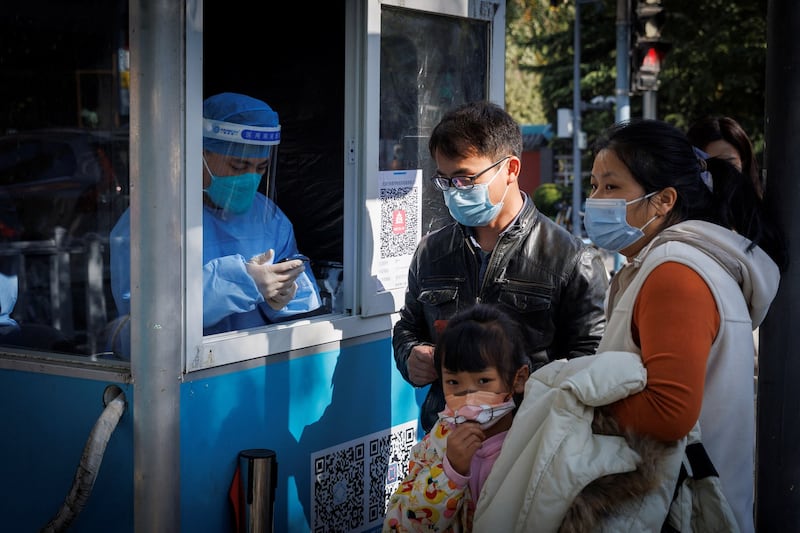In an apparent escalation of Chinese leader Xi Jinping's zero-COVID policy, Beijing residents are being hauled off to compulsory quarantine if they cross paths in public with a person who tests positive for COVID-19, they told RFA on Thursday.
A Beijing resident who asked to remain anonymous for fear of reprisals said she was recently ordered into isolation by her local neighborhood committee -- the most local branch of government -- after the Health Code COVID-19 tracker app showed she had been in a public place at the same time as someone who later tested positive for the virus.
"Someone came to inform me today that I have to quarantine at home for seven days, just because I intersected with a confirmed case in time and space," the woman said. "It's totally unreasonable."
"The neighborhood committee notified me, and I questioned it, so they told me to contact the police, who asked me if I was going to be cooperative," she said. "So what could I do, if they've made this policy and order me into quarantine at home?"
The woman said that most residents of the city -- which requires a green code generated from a negative PCR test from the past 48 hours to enter from the rest of China -- are now being told to scan their Health Code app every time they enter a public place.
The data gets sent back in real time to the disease control and prevention centers, which then generate a list, she said, adding that those on the list are sent into isolation, or taken to quarantine camps.
The woman said that previously, only people who tested positive for COVID-19 were forced into quarantine in this way.
"They have quarantined me without determining whether or not I'm a case," she said, questioning whether neighborhood committees had the power to enforce the law.
Under an amended administrative punishment law that took effect in July 2022, China recently empowered local officials at township, village, and neighborhood level to enforce the law.
A Beijing resident who gave only the surname Zhang said anyone who enters an amber or red-coded area where COVID-19 has been found will wind up with restrictions on their movements.
He said the app will prevent them from swiping into public places, including public transportation, until they have logged three consecutive negative COVID-19 tests over the space of a week.
"You have to report to your residential committee, do a PCR test every day, then don't go to any high-risk areas," Zhang said. "Then it will change [back to green] in about seven days."
Getting around the system
Online tips and hacks abound, all promising ways to get around the traffic-light system, including people offering phones or SIM cards for sale that have been “washed clean” in a green-code area for people needing to avoid restrictions.
Some online comments suggested sending one's SIM card, by post, or with a friend or loved one, to green-coded areas, to wipe the amber or red code from the phone user's record.
Others recommended switching off GPS location tracking, while some people who have been prevented from entering Beijing by a pop-up on the Health Code are opting to wait in green-coded cities in neighboring Hebei province for their codes to turn green, according to social media posts seen by RFA.
Guangzhou lockdown
Meanwhile, residents of the southern city of Guangzhou said some neighborhoods of the city are currently under lockdown, with varying degrees of compliance reported on the streets.
A resident of Guangzhou's Baiyun district who gave only the pseudonym M for fear of reprisals said her e-commerce business has been badly affected by the COVID-19 restrictions, as supply chains and express delivery services are being disrupted by roadblocks.
"We have no access to express delivery services at all right now, or it's very unstable," M said. "On the first day, we were told we couldn't dispatch any goods, and on the second day we were told we could. Then ... on day three, our courier said they could arrange to have them delivered secretly."
"There has been no way to send anything to Xinjiang by post for the past three months," she said.
She said entry and exit restrictions in the area were only partially being obeyed, amid unclear communication from local authorities.
"One minute they're not letting anyone in or out, then the next minute they say you can come and go," M said. "It's very chaotic."

A Guangzhou resident who gave the nickname Xiao Wei said local factories were still operating in the city's Haizhu district.
"It's all quiet in the first part of the night, but then the lights all came on halfway through the night," Xiao Wei said from a location close to Guangzhou’s International Textile City, where most of the migrant workers hail from the central province of Hubei.
Local COVID-19 enforcers and Chinese Communist Party volunteers had been turning a blind eye to the practice, Xiao Wei said.
"They stopped the driver of one express delivery truck, but he told them he needs to make a living, so they let him through ... they had no choice," Xiao Wei said. "The walls they made out of traffic barriers are now full of holes where they have been destroyed."
M said similar breakouts had been seen where she lives.
"There are a lot of fences ... and some residents have been breaking through the fences to leave," she said. "There's no other way for them to survive."
"A lot of people are hanging around the intersection and fleeing when there are few people around [to stop them]."
Translated and edited by Luisetta Mudie.
